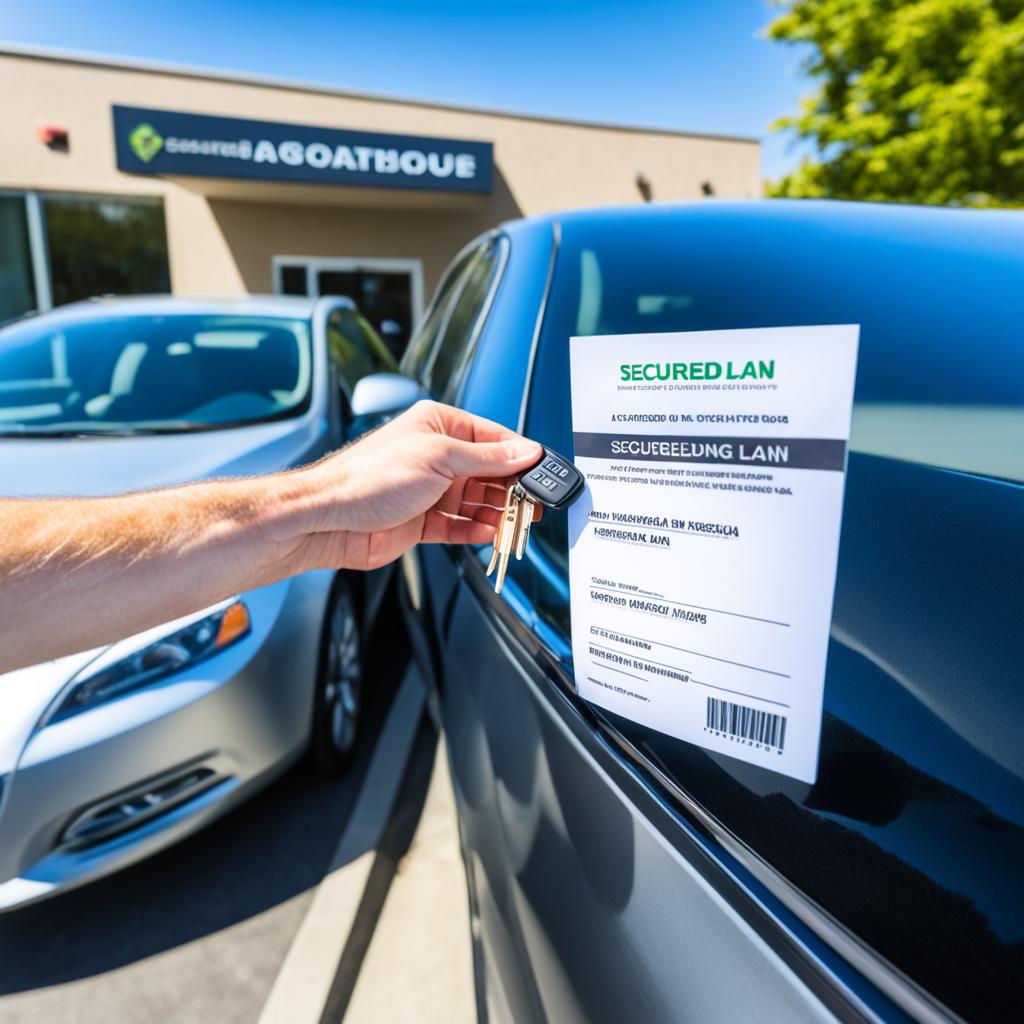Are you planning to buy a car but need financing? A secured loan with a financed car could be the solution you’re looking for. This type of loan allows you to use the car you’re purchasing as collateral, providing benefits such as lower interest rates and increased eligibility for borrowers with poor credit. However, before diving into the process, it’s crucial to understand how secured auto loans work and the factors to consider.
Key Takeaways:
- Secured auto loans use the car being financed as collateral.
- They offer larger loan amounts and competitive interest rates.
- Borrowers need to be aware of the risks and responsibilities associated with using a car as collateral.
- Exploring alternative options and comparing rates is essential to find the best loan terms.
What is a Secured Auto Loan?
A secured auto loan is a type of loan that uses the car being financed as collateral. This means that if the borrower is unable to repay the loan, the lender has the right to repossess the vehicle. Secured auto loans are the standard option in the market, and they offer larger loan amounts and competitive interest rates compared to unsecured auto loans.
Most banks, credit unions, online lenders, and dealerships exclusively offer secured car loans. By using the car as collateral, lenders have a financial safety net, allowing them to provide larger loan amounts and more favorable terms to borrowers.
With a secured auto loan, borrowers can enjoy the benefits of lower interest rates and flexible repayment terms. This type of loan is ideal for individuals with poor credit or no credit history, as the vehicle serves as security for the lender. It also gives borrowers the opportunity to finance a car even if they don’t have the full purchase amount upfront.
“A secured auto loan offers borrowers the chance to finance a car while using the vehicle as collateral, providing lenders with a sense of security and allowing borrowers to benefit from competitive loan terms.”
Secured auto loans provide an excellent financing option for those looking to purchase a vehicle. The collateral nature of these loans reduces the risk for lenders and increases the chances of approval for borrowers.
Benefits of a Secured Auto Loan:
- Lower interest rates compared to unsecured loans
- Larger loan amounts
- Flexible repayment terms
- Opportunity to finance a vehicle with poor or no credit history
| Factors | Secured Auto Loans | Unsecured Auto Loans |
|---|---|---|
| Interest Rates | Lower | Higher |
| Loan Amounts | Larger | Smaller |
| Repayment Terms | Flexible | Less flexible |
| Credit History | Poor or no credit accepted | Good credit required |
These advantages make secured auto loans an attractive option for borrowers looking to purchase a vehicle while minimizing financial risk. However, it is important to carefully consider the repayment terms, as failure to make timely payments could result in the repossession of the vehicle.
How Does a Secured Auto Loan Work?
When it comes to financing a car under a loan, a secured auto loan is a popular choice for many borrowers. With a secured auto loan, the borrower uses the car they are purchasing as collateral for the loan. This means that if the borrower fails to make the loan payments, the lender has the right to repossess the vehicle.
“A secured auto loan provides lenders with the reassurance of collateral, which makes it easier for borrowers to qualify for the loan and often results in lower interest rates compared to unsecured loans,” explains John Smith, a financial advisor.
Secured auto loans offer several advantages over their unsecured counterparts. Not only are they generally easier to qualify for, but they also often come with longer terms and a quicker application process.
The Application Process for a Secured Auto Loan
If you’re considering applying for a secured loan with existing car finance, here’s a step-by-step guide on how the process typically works:
- Gather your financial documents: To apply for a secured auto loan, you’ll need to provide proof of income, employment details, identification, and documentation related to your existing car finance.
- Research lenders: It’s essential to compare rates, terms, and fees from different lenders to find the best option for your specific needs. Remember to consider both traditional banks and online lenders.
- Complete the application: Fill out the loan application form and provide the requested information. This may include details about the car you’re purchasing, your credit history, and your income and expenses.
- Wait for loan approval: The lender will review your application and determine whether you meet their eligibility criteria. This process typically takes a few days.
- Sign the loan agreement: If your loan application is approved, you’ll be presented with a loan agreement detailing the terms and conditions of the loan. Carefully review the agreement before signing.
- Receive the funds: Once you’ve signed the loan agreement, the lender will disburse the funds. This will allow you to purchase the car you’ve chosen.
- Repay the loan: Make regular monthly payments according to the agreed-upon terms. This will help you repay the loan in full and build a positive credit history.
By understanding how a secured auto loan works and following the necessary steps, you can successfully finance a car under a loan while utilizing your existing car finance as collateral.
| Benefits of Secured Auto Loans | Downsides of Secured Auto Loans |
|---|---|
|
|
Benefits of Secured Car Loans
Secured car loans offer several benefits to borrowers. Firstly, they allow for larger loan amounts, often financing up to 110% to 125% of the vehicle’s value. This can help cover additional expenses such as gap insurance or extended warranties. Additionally, secured car loans tend to have lower interest rates compared to unsecured loans, making them more affordable. They are also easier to qualify for, even for borrowers with poor credit.
When considering financing options, using a financed car as collateral for a loan can be a wise choice. With secured car loans, borrowers can leverage their existing car loan to access larger loan amounts and more favorable terms. This can provide the financial flexibility needed to cover expenses related to the vehicle and improve overall affordability.
Key Benefits:
- Higher loan amounts, up to 110% to 125% of the vehicle’s value
- Lower interest rates compared to unsecured loans
- Easier qualification, even for borrowers with poor credit
- Flexibility to cover additional expenses like gap insurance or extended warranties
By using the financed car as collateral, borrowers can unlock the full potential of their vehicle’s value and secure the financing needed for their financial goals.
Next, we’ll explore the downsides of secured auto loans and alternative options to consider.
Downsides of Secured Auto Loans
While secured auto loans offer several advantages, it is essential to consider the potential downsides before making a decision. Here are a couple of factors to keep in mind:
- Less Flexibility: Unlike unsecured loans, which can be used for various purposes, secured loans can only be used for expenses related to the vehicle. This limited flexibility can restrict borrowers who may require funds for other financial obligations.
- Risk of Repossession: A major concern with secured auto loans is the risk of repossession. If a borrower defaults on the loan and fails to make timely payments, the lender has the right to repossess the car. This can be a significant setback, leaving the borrower without both the vehicle and the funds borrowed.
It’s important to carefully weigh the benefits and downsides when considering a secured auto loan. While they can provide access to larger loan amounts and lower interest rates, the limited flexibility and potential repossession risk should be taken into account. It’s always advisable to explore alternative financing options and ensure the ability to comfortably repay the loan to avoid any adverse consequences.
Using a Car as Collateral for a Loan
Yes, it is possible to use a financed car as collateral for a secured loan. However, there are certain considerations to keep in mind. The borrower must have equity in the vehicle, meaning that the car’s value should be higher than the remaining balance on the loan. This ensures that the lender has sufficient collateral in case of default.
This can become challenging if the car is depreciating quickly or if the borrower is upside down on the loan, owing more than the car is worth. It’s important to assess the car’s current value and compare it to the outstanding loan balance before using it as collateral.
Lenders may also have specific restrictions on the age and mileage of the car for collateral. They may prefer newer vehicles with lower mileage as they are considered more valuable and have a longer lifespan. These criteria can vary depending on the lender’s policies and the specific loan program.
Auto Equity Loans
Are you in need of some extra cash but don’t want to take out a traditional car title loan? Consider an auto equity loan as a more affordable alternative. Auto equity loans allow you to borrow money against the equity you have in your car, providing a flexible financing option.
What is equity? Equity refers to the difference between the value of your car and the remaining balance on your loan. If your car is worth more than what you owe, you have equity in your vehicle.
Unlike car title loans, auto equity loans offer lower interest rates and longer repayment terms, making them a more financially feasible option. With these loans, you can access the funds you need without facing exorbitant interest rates or short repayment deadlines.
Before committing to an auto equity loan, it is crucial to understand the terms and conditions. Take the time to read the loan agreement carefully and ensure that you can comfortably afford the monthly payments. Remember, failing to repay the loan could result in the loss of your vehicle.
If you’re considering an auto equity loan, it’s wise to compare lenders and their offers. Look for reputable lenders with competitive interest rates, transparent fees, and positive customer reviews. Doing your research will help you find the best loan terms for your specific needs.
Before making any financial commitments, consult with a reliable financial advisor who can guide you through the process and help you make an informed decision.
| Advantages of Auto Equity Loans | Disadvantages of Auto Equity Loans |
|---|---|
|
|
Auto equity loans can provide the financial boost you need without putting your car at significant risk. However, it’s essential to carefully consider your options and only borrow what you can afford to pay back. With responsible borrowing and diligent repayment, an auto equity loan can be a viable solution for your financial needs.
Car Title Loans
Car title loans provide an alternative option for individuals who want to use their financed car as collateral. With this type of loan, borrowers can borrow a percentage of their car’s value by surrendering their car title to the lender as collateral. However, it’s important to note that car title loans typically come with short repayment terms and high interest rates, which can make them a more expensive borrowing option.
Before considering a car title loan, it’s crucial to carefully evaluate the associated terms and fees to make an informed decision. While this type of loan can offer quick access to funds, it’s essential to weigh the potential financial implications and explore other financing options if available.
The Risks of Car Title Loans
Car title loans can be a viable solution for those in need of quick cash, but it’s crucial to be aware of the risks involved. These loans often come with higher interest rates and shorter repayment terms compared to traditional secured loans. Additionally, if a borrower fails to repay the loan, they risk losing ownership of their car, as the lender can seize the vehicle. It’s important to carefully assess one’s ability to meet the repayment obligations before considering a car title loan.
Other Forms of Collateral for Loans
If using a car as collateral for a loan is not the right option, there are other forms of collateral that can be used. These include:
- Cash in a savings account or CD: Consider using your savings or a certificate of deposit as collateral for a loan. Lenders may offer favorable terms if you have a substantial amount of cash on hand.
- A house: If you own a property, you can explore the possibility of using it as collateral for a loan. Home equity loans and home equity lines of credit (HELOCs) are common options.
- Stocks or bonds: If you have investments in stocks or bonds, you may be able to use them as collateral. This can be an alternative to using a car as collateral.
- A life insurance policy with cash value: Some life insurance policies allow you to borrow against the cash value. This can provide a source of collateral for a loan.
- Jewelry, art, antiques, or precious metals: Valuable assets like jewelry, art, antiques, or precious metals can also be used as collateral for a loan. However, the value of these items may need to be appraised.
The choice of collateral will depend on the lender’s requirements and the borrower’s assets. It’s important to carefully consider the value and liquidity of the collateral before using it to secure a loan.
Lenders Offering Secured Car Loans
If you’re looking to secure a car loan with your financed vehicle, there are several lenders that can help. Here are some options to consider:
- OAS Federal Credit Union
- TruChoice Federal Credit Union
- OneMain Financial
- Upstart
- Avant
When exploring secured car loan options, it’s important to shop around and compare rates, terms, and fees. Every lender has its own criteria and offers, so conducting thorough research is crucial to finding the best fit for your specific needs.
Additionally, don’t forget to consider local banks and credit unions, as they may also provide personal loans using a car as collateral.
Alternatives to Using Your Car as Collateral
When considering a loan, using your car as collateral may come with risks that you’d rather avoid. Thankfully, there are alternative financing options available that can provide you with the funds you need without putting your car at risk. Here are some alternatives to consider:
- Unsecured Loans: Instead of using your car as collateral, you can explore unsecured loans that offer affordable interest rates. These loans are typically based on your creditworthiness and income, without the need for any collateral.
- Borrowing from Friends or Family: If you’re in need of funds, reaching out to trusted friends or family members who may be willing to lend you money can be a viable option. Just remember to treat it as a formal borrowing arrangement and agree upon repayment terms.
- Saving Up: If time permits, you could save up the needed funds to finance your expenses. This approach allows you to avoid taking on additional debt and reduces the risk associated with collateralized loans.
- Increasing Income: Finding ways to increase your income, such as taking on a part-time job or freelancing, can provide you with the extra funds you need without having to rely on collateralized loans.
It’s important to carefully consider these alternatives before using your car as collateral for a loan. By exploring these options, you can find a financing solution that aligns with your financial goals and minimizes unnecessary risks.
Remember, each alternative comes with its own advantages and considerations, so be sure to weigh your options and choose the one that best suits your needs. By making an informed decision, you can confidently finance your expenses without putting your car in jeopardy.
Image:

| Financing Option | Advantages | Considerations |
|---|---|---|
| Unsecured Loans | – No collateral required – Affordable interest rates |
– Eligibility based on creditworthiness – Limited loan amounts |
| Borrowing from Friends or Family | – Flexible repayment terms – Potential for lower or no interest |
– Personal relationships may be affected – Formal agreement recommended |
| Saving Up | – Avoid additional debt – No risk to collateral |
– Requires time and discipline – Delayed access to funds |
| Increasing Income | – No reliance on collateral – Potential long-term financial benefits |
– Time and effort required – May not be viable for everyone |
Important Considerations for Secured Loans
When considering a secured loan, I highly recommend meticulously reviewing the terms and conditions. Pay close attention to crucial elements such as interest rates, repayment terms, and fees. By thoroughly understanding these factors, you can make an informed decision and ensure that the loan aligns with your financial goals.
One of the most important aspects to assess is your ability to make consistent loan payments. Take into account your monthly budget and consider any potential changes in your income or expenses. It’s essential to be confident in your capacity to meet the payment obligations throughout the loan term.
Additionally, it is crucial to evaluate the potential consequences of defaulting on the loan. In the event that you are unable to make the payments, the lender has the right to repossess the vehicle used as collateral. This can have a significant impact on your credit score and future borrowing opportunities.
To make an informed decision, I advise comparing rates and fees from different lenders. This will enable you to secure the best possible deal, ensuring that you receive competitive rates and favorable terms. Don’t hesitate to reach out to multiple lenders and ask for loan estimates to compare and evaluate your options.
Making an Informed Decision
“Taking the time to carefully assess the terms and understand the associated risks of a secured loan can significantly impact the success of your borrowing experience. Ensure that you evaluate your financial situation thoroughly and compare various offers to find the most favorable loan terms.”
Secured Loan Considerations:
- Review terms and conditions, including interest rates, repayment terms, and fees.
- Assess your ability to make loan payments and consider potential changes in your financial circumstances.
- Evaluate the consequences of defaulting on the loan, including vehicle repossession and potential impact on your credit score.
- Compare rates and fees from different lenders to secure the best possible deal.
By following these guidelines and taking the necessary precautions, you can ensure that your secured loan experience is both beneficial and financially secure.
| Pros of Secured Loans | Cons of Secured Loans |
|---|---|
| Lower interest rates compared to unsecured loans | Vehicle serves as collateral, risking repossession if payments are not made |
| Easier qualification, even for borrowers with poor credit | Less flexibility in how loan funds can be used compared to unsecured loans |
| Potentially larger loan amounts than unsecured loans | May require a larger down payment |
The Borrower’s Responsibility
When taking out a secured loan with a financed car as collateral, borrowers must understand their responsibility in the loan agreement. It is crucial to budget for monthly loan payments to ensure timely repayments and avoid defaulting on the loan. Defaulting on a loan can have a negative impact on the borrower’s credit score, making it harder to secure future financing options.
Additionally, borrowers should familiarize themselves with the lender’s repossession policy. If the borrower fails to meet their loan obligations, the lender has the right to repossess the vehicle. Understanding the consequences of repossession is essential in making informed decisions regarding the loan.
“Responsibility is the price of freedom; it is the price of securing a loan.”
Borrowers must also consider any potential fees associated with the loan. Lenders may charge fees for late payments, early repayment, or other loan-related services. These fees can add to the overall cost of the loan and should be factored into the borrower’s financial planning.
| Responsibilities | Tips |
|---|---|
| Budgeting for loan payments | Track monthly expenses and income to ensure loan payments are affordable and timely. |
| Understanding repossession policies | Read and understand the terms of the loan regarding repossession, and know your rights as a borrower. |
| Awareness of potential fees | Review the loan agreement for any fees associated with the loan and plan accordingly. |
By taking their responsibilities seriously, borrowers can ensure a smooth repayment process and maintain a positive financial standing. It is important to regularly assess one’s financial situation and make necessary adjustments to meet loan obligations.
Factors to Consider Before Applying for a Loan
Before applying for a secured loan with existing car finance, there are several important factors to consider. These factors will greatly impact your eligibility and the terms of your loan. Taking the time to evaluate these areas will help you make an informed decision and find a loan that best suits your needs.
Credit Score
One of the first factors to consider is your credit score. Lenders will use your credit score to assess your creditworthiness and determine the interest rate and loan terms. A higher credit score will generally result in more favorable loan terms, while a lower credit score may lead to higher interest rates or the need for a cosigner.
Income
Your income is another crucial factor that lenders consider. They want to ensure that you have a stable source of income to make timely loan payments. Lenders typically have a minimum income requirement, which varies based on the loan amount and other factors. Assess your income to determine if you meet the lender’s criteria.
Debt-to-Income Ratio
Debt-to-income (DTI) ratio is a measure of your monthly debt payments compared to your monthly income. Lenders use this ratio to assess your ability to manage additional debt. To calculate your DTI ratio, add up all your monthly debt payments (including rent or mortgage, credit card payments, student loans, etc.) and divide it by your gross monthly income. Most lenders prefer a DTI ratio below 43%.
Research and Comparison
Don’t settle for the first lender you come across. Take the time to research and compare different lenders to find the best deals and rates. Look for lenders that specialize in secured loans and have experience working with financed vehicles. Read customer reviews to gauge their reputation and customer service. Comparing rates, fees, and loan terms will help you find a reputable lender with favorable terms.
Remember, applying for a secured loan with existing car finance is a significant financial obligation. Take the time to thoroughly evaluate your situation and consider all the factors before committing to a loan. Doing so will help ensure you secure the best loan terms and repayment plan for your needs.

| Factors to Consider | Details |
|---|---|
| Credit Score | Assess your credit score and understand how it will impact loan terms |
| Income | Evaluate your income to determine if it meets the lender’s criteria |
| Debt-to-Income Ratio | Calculate your DTI ratio to ensure it falls within the lender’s preferred range |
| Research and Comparison | Take the time to research and compare different lenders to find the best rates and terms |
Conclusion
In conclusion, securing a loan using a financed car as collateral is a viable option. With secured auto loans, borrowers can access larger loan amounts, benefit from lower interest rates, and have a better chance of approval, even with poor credit. However, it is crucial to consider the potential risks and responsibilities associated with using a car as collateral.
Before proceeding, borrowers should carefully evaluate their ability to make loan payments and understand the consequences of defaulting on the loan. It is also prudent to explore alternative financing options and compare rates from different lenders to ensure the best terms and conditions for their specific needs.
By conducting thorough research, assessing financial capabilities, and understanding the terms of the loan, borrowers can make an informed decision regarding secured loans with a financed car. Remember to prioritize responsible borrowing to avoid any negative impact on credit and financial stability.
FAQ
What is a secured auto loan?
How does a secured auto loan work?
What are the benefits of secured car loans?
What are the downsides of secured auto loans?
Can I use a financed car as collateral for a secured loan?
What are auto equity loans?
What are car title loans?
What are the other forms of collateral for loans?
Which lenders offer secured car loans?
What are the alternatives to using a car as collateral?
What are important considerations for secured loans?
What factors should be considered before applying for a loan?
Source Links
- https://www.bankrate.com/loans/auto-loans/can-i-use-my-car-as-collateral-for-a-loan/
- https://www.bankrate.com/loans/auto-loans/secured-auto-loans/
- https://www.self.inc/info/using-car-as-collateral-for-loan/
Money posts:
 Apply for Car Loan: Easy Steps to Your Dream Car (2024)
Apply for Car Loan: Easy Steps to Your Dream Car (2024)
 What Is Direct Lending? A Beginner’s Guide
What Is Direct Lending? A Beginner’s Guide
 Best Debt Consolidation Loans: Clear Debt Faster (2024)
Best Debt Consolidation Loans: Clear Debt Faster (2024)
 Allocated Waiver Mortgage: Simplify Your Home Loan (2024)
Allocated Waiver Mortgage: Simplify Your Home Loan (2024)
 Best Egg Loan: Cracking The Code to Easy Loans (2024)
Best Egg Loan: Cracking The Code to Easy Loans (2024)
 Buy a House with No Money Down: Is It Possible? The dream of homeownership is within reach, even if you don’t have a substantial down payment. As a first-time home buyer, you may be wondering: Can you buy a house with no money down? The answer is yes! There are options available that can help you achieve your goal of owning a home without a large upfront payment. Key Takeaways: It is possible to buy a house with no money down, especially as a first-time home buyer. Specific first-time home buyer loans and assistance programs offer the opportunity to purchase a home with zero down payment. Government grants and loans are available to offset the initial costs of homeownership, such as closing costs. As a first-time homebuyer, you can take advantage of first-time homebuyer loans that require no down payment. These loans, such as the FHA loan and Conventional 97, allow for as little as 3% down. Additionally, there are government grants and loans available that can further offset the upfront costs of purchasing a home. While conventional and FHA loans typically require a minimum 3% to 3.5% down payment, exceptional options exist for certain groups. Veterans and rural homebuyers with moderate to low incomes may qualify for zero down payment loans. These programs open the door to homeownership without the need for a substantial upfront payment. Low down payment options are also available for first-time homebuyers. FHA loans, for instance, require a down payment as low as 3.5%, making homeownership more attainable for individuals with limited funds. Additionally, there are various low-income homebuyer programs at both the state and federal levels that offer grants or low-interest loans to cover down payments and closing costs. Government-backed loans, such as VA loans and USDA loans, are zero-down mortgages that make it possible for buyers with limited financial flexibility to purchase a home without a large upfront down payment. VA loans cater to military veterans and offer benefits like no down payment and no mortgage insurance. USDA loans promote homeownership in rural and certain suburban areas, also with no down payment required. If you’re wondering how to cover the down payment, there are options available. Down payment assistance programs offer grants or low-interest loans to help cover down payments and closing costs. Another option is receiving a down payment gift from a family member, which can help reduce the upfront expenses. It’s important to note that lenders often require a gift letter stating that the money is a gift and not a loan. In conclusion, buying a house with no money down is possible through various first-time homebuyer loans and assistance programs. These options eliminate the need for a traditional down payment, making homeownership more accessible for individuals with limited upfront funds. Whether you qualify for a zero-down payment loan, a low-down-payment option, or assistance programs, it’s important to explore all available options and work with a trusted lender or home lending expert to find the best mortgage solution for your unique situation and goals.
Buy a House with No Money Down: Is It Possible? The dream of homeownership is within reach, even if you don’t have a substantial down payment. As a first-time home buyer, you may be wondering: Can you buy a house with no money down? The answer is yes! There are options available that can help you achieve your goal of owning a home without a large upfront payment. Key Takeaways: It is possible to buy a house with no money down, especially as a first-time home buyer. Specific first-time home buyer loans and assistance programs offer the opportunity to purchase a home with zero down payment. Government grants and loans are available to offset the initial costs of homeownership, such as closing costs. As a first-time homebuyer, you can take advantage of first-time homebuyer loans that require no down payment. These loans, such as the FHA loan and Conventional 97, allow for as little as 3% down. Additionally, there are government grants and loans available that can further offset the upfront costs of purchasing a home. While conventional and FHA loans typically require a minimum 3% to 3.5% down payment, exceptional options exist for certain groups. Veterans and rural homebuyers with moderate to low incomes may qualify for zero down payment loans. These programs open the door to homeownership without the need for a substantial upfront payment. Low down payment options are also available for first-time homebuyers. FHA loans, for instance, require a down payment as low as 3.5%, making homeownership more attainable for individuals with limited funds. Additionally, there are various low-income homebuyer programs at both the state and federal levels that offer grants or low-interest loans to cover down payments and closing costs. Government-backed loans, such as VA loans and USDA loans, are zero-down mortgages that make it possible for buyers with limited financial flexibility to purchase a home without a large upfront down payment. VA loans cater to military veterans and offer benefits like no down payment and no mortgage insurance. USDA loans promote homeownership in rural and certain suburban areas, also with no down payment required. If you’re wondering how to cover the down payment, there are options available. Down payment assistance programs offer grants or low-interest loans to help cover down payments and closing costs. Another option is receiving a down payment gift from a family member, which can help reduce the upfront expenses. It’s important to note that lenders often require a gift letter stating that the money is a gift and not a loan. In conclusion, buying a house with no money down is possible through various first-time homebuyer loans and assistance programs. These options eliminate the need for a traditional down payment, making homeownership more accessible for individuals with limited upfront funds. Whether you qualify for a zero-down payment loan, a low-down-payment option, or assistance programs, it’s important to explore all available options and work with a trusted lender or home lending expert to find the best mortgage solution for your unique situation and goals.
 What is a Cash-Out Refinance? (2024)
What is a Cash-Out Refinance? (2024)
 Build Credit Card: Fast Track to a Great Score (2024)
Build Credit Card: Fast Track to a Great Score (2024)

